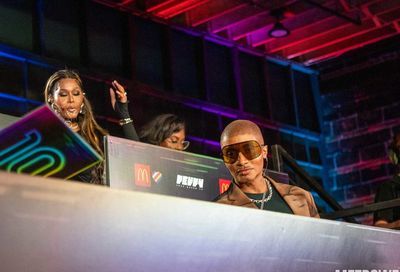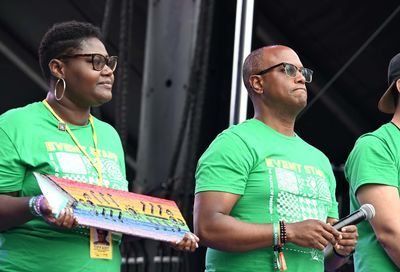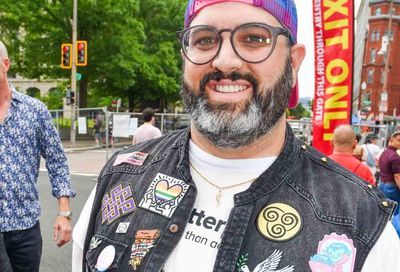Girl Meets Whirl
Alphabet Soup
This new wave of television programming designed to challenge and confuse our notions of what is straight and what is gay has me, well, challenged and confused.
I refer, of course, to the Tuesday night line-up on Bravo, the double-punch of Boy Meets Boy and Queer Eye for the Straight Guy.
On the latter, as everybody well knows by now, a group of men living out five of the gayest stereotypes possible come to the aid of hapless straight men, prettying them up in order to impress each straight guy’s wife, girlfriend or entire social clique.
The kicker is that they don’t show up and faggotize their subjects; instead they work within each straight man’s personality parameters to create a look and setting that suits his way-straight lifestyle.
On the former, 15 male suitors — annoyingly dubbed “the mates” by the show’s excessively British hostess — are vying for the heart of earnestly gay James, starring in the role of The Bachelor (or The Bachelorette, depending on how campy you are).
What James doesn’t know, as our hostess tells us again and again and again and again, is that some of “the mates” are straight. We (the viewing audience) are supposed to watch James sweetly suffer as he whittles down his gaggle of paramours in total oblivion while we giddily guess who’s gay and who’s straight, and we don’t find out for sure until a guy is axed.
So, what is gay? Since when does queeny Carson on Queer Eye, given the chance to make all of his subjects wear leather capri pants and T-shirts that are three sizes too small, pick outfits that make a butch man look even more masculine? How does sweet little Paul from Boy Meets Boy, the most obviously gay 23-year-old I’ve seen since they invented circuit parties, turn out to be straight?
I watched the first episode of Boy Meets Boy with my niece, Tara, who’s 18 and down with my whole lesbianism thing and who has, to my shock, worked with at least one openly gay man in the small Iowa town where she lives. She immediately dismissed the premise of the show, saying, “This is stupid. Wouldn’t his gaydar or whatever tell him who’s gay?”
Oh, girl. Would that it were so easy. The truth is that gaydar is a patented device of the humiliation industry, designed to make gay people feel really stupid when they guess incorrectly about another person’s sexual orientation.
My well-meaning straight boss and I have had this conversation about a million times where we talk about someone we’ve met and he wonders if she is a lesbian or he is a gay man, based on her declared interest in women’s studies and shunning of make-up or his impeccable grooming habits and refined demeanor. Every time he asks me if I think the person is gay.
Every time I say I have no idea, that there’s a chance — maybe, maybe not. I feel like I’m placating him when I’m able to provide a shard of evidence in either direction. But the fact is that I really don’t care until much later in the process of getting to know someone, about the time I start to realize that I have no idea whether the person is gay or straight and my so-called gaydar has, once again, failed me miserably.
I try to trick myself into thinking that I’m so open-minded that I don’t make assumptions in either direction. I tell myself that nothing would surprise me on this front, including if my well-meaning straight boss came in to work one day and told me he spent the evening before at the Eagle and picked up some big burly man who…well, you go ahead and insert your own imagery here. But just as that scenario would, in truth, leave me dazed and disoriented, I find myself sometimes shrouded in cognitive dissonance in the real world.
I’ve come to realize that I take too much for granted, that I expect honesty and forthrightness when it comes to personal revelations about sexual identity. Because I pour my guts out in print every other week, I figure there’s no reason someone wouldn’t come clean with me about where they fit in this crazy puzzle of life. But I find myself constantly guessing and unable to figure out who fits where, and wondering why the answer isn’t just written on our foreheads.
More annoyingly, why is it so taboo to ask people about their sexual orientation if they don’t offer it? Why are we so protective of another person’s need to conform and be pychosexually secure that it becomes an insult, almost, to suggest that it’s not clear to us if he or she is gay or not? It’s not just that we worry that we’ll offend straight people if we tell them we perceive them as gay — don’t we also worry sometimes that some gay people might be offended that we could somehow tell that they were gay?
When I was in college and starting to come out, I had a couple of professors who were, I was pretty sure, lesbians. Behind closed doors at specially requested meetings, I dangled pieces of my soul before each one, hoping she would take the bait and affirm me while confirming my intuition.
What happened was I got affirmation out the wazoo — including the psychology professor telling me she wished she kept liquor in her desk drawer for such occasions, so she could pull out a bottle for a celebratory drink — and not a shred of confirmation.
Later I learned that I was correct in both instances, so why did it have to be so agonizing to bear my soul and walk away embraced but unenlightened?
Once, a pretty clearly lesbian friend of mine decided that it was time for her to experience sex with a man. She’d had only the most minimal physical experience with men before she came out, and her curiosity eventually got the best of her. As she pursued her ambitions, I discussed the matter with a straight friend I had come to know pretty well.
The straight friend was confused at first, asking if my lesbian pal was going to start dating men. I said no chance, it was merely a matter of curiosity and intrepidity.
“So,” she asked me, “like trying hang-gliding?”
Yes, I told her, just like trying hang-gliding. We then set off on a wild ride of hang-gliding metaphors and innuendo until I summoned the courage to ask her if she would ever try figurative parasailing if she had the chance.
It turned out she had spent a few months parasailing with one woman in college before she met the man she married. I’d never known about this, in part because I’d never asked and in part because we live in a complicated world. I was chagrined to find that her revelation shocked me — Miss Open-Minded — and I reminded myself (again, again) to please stop making assumptions about people.
My own queer eye trained to question its instincts, all I can do is hope that James from Boy Meets Boy at least gets one of the straight “mates” to have sex with him before the season is over.
Kristina Campbell defies lesbian stereotypes, except for some that are always true and a few that are almost never true. She writes “Alphabet Soup” biweekly and can be reached at kcampbell@metroweekly.com.
Support Metro Weekly’s Journalism
These are challenging times for news organizations. And yet it’s crucial we stay active and provide vital resources and information to both our local readers and the world. So won’t you please take a moment and consider supporting Metro Weekly with a membership? For as little as $5 a month, you can help ensure Metro Weekly magazine and MetroWeekly.com remain free, viable resources as we provide the best, most diverse, culturally-resonant LGBTQ coverage in both the D.C. region and around the world. Memberships come with exclusive perks and discounts, your own personal digital delivery of each week’s magazine (and an archive), access to our Member's Lounge when it launches this fall, and exclusive members-only items like Metro Weekly Membership Mugs and Tote Bags! Check out all our membership levels here and please join us today!






















